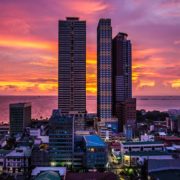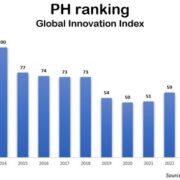Amid the tapering off of inflationary pressures and the government’s infrastructure push, the Asian Development Bank (ADB) is expecting Philippines’ economic growth to pick up next year.
In an update of Asian Development Outlook (ADO), ADB’s annual economic publication, the bank said the Philippine economy has the capability to accelerate to 6.7 percent in 2019 after growing 6.4 percent this year.
The Bank’s revised outlook for the Philippines — from 6.8 percent in 2018 and 6.9 percent in 2019 — “reflects a moderation in agricultural output and exports, as well as higher inflation and continued global monetary tightening,” as reported by the Philippine News Agency.
ADB Country Director for the Philippines Kelly Bird in a press briefing described the 6.4-percent a “very robust” economic growth rate for this year amid the country’s strong economic fundamentals.
“It’s in line with the Philippine long-term growth seen in the last several years driven by private investment. We also believe that prediction for next year is around 6.7 percent again, that will be driven by investment. And we expect that to further pick up because a lot of the flagship projects under the government Build, Build, Build program will start to come on stream next year,” he said.
According to him, country’s inflation rate is also expected to start moving towards the Bangko Sentral ng Pilipinas’ target range of 2 to 4 percent next year, as policy measures take effect.
“As monetary tightening begins to kick in, inflation will likely moderate in 2019 to 4 percent, the forecast revised up marginally from 3.9 percent,” the ADB stressed.
“The removal of administrative constraints and non-tariff barriers on food imports and implementation of productivity enhancement programs for agriculture should help stem supply side constraints on rice over time,” the ADB also said in its ADO.
The bank attributed the headline inflation rising to average 4.8 percent in the first eight months of 2018 with the supply-side factors like poor crop production, higher international oil prices and peso depreciation.
Bird referred to ADB’s analysis to show how the excise taxes on automobiles, petroleum products, sugar-sweetened beverages and tobacco under the Duterte administration’s Tax Reform for Acceleration and Inclusion (TRAIN), have a “relatively minor impact” on the consumer price index (CPI).
The CPI is most widely used in the calculation of the inflation rate and purchasing power of the peso. It is an indicator of the change in the average retail prices of a fixed basket of goods and services commonly purchased by households relative to a base year.
Bird explained that TRAIN is not the cause of the inflation surge in the past few months. “If you look at it, it’s food price inflation that is across-the-board. It really does tell me that the inflation is because of issues on the supply side also, oil price is now above USD80 (per barrel).”
He also stressed that “very proactive measures” vital in addressing inflation in the country have been taken by the Philippines
He said that, in order to slow down credit growth, the BSP lifted the policy rate by 100 basis points; meanwhile, the government removed administrative restrictions on imports of food items and other commodities.
“What the government has been doing in response to inflation are the right policies. They are not imposing price controls rather they are removing those restrictions to allow for a more efficient trade policy,” he added.







